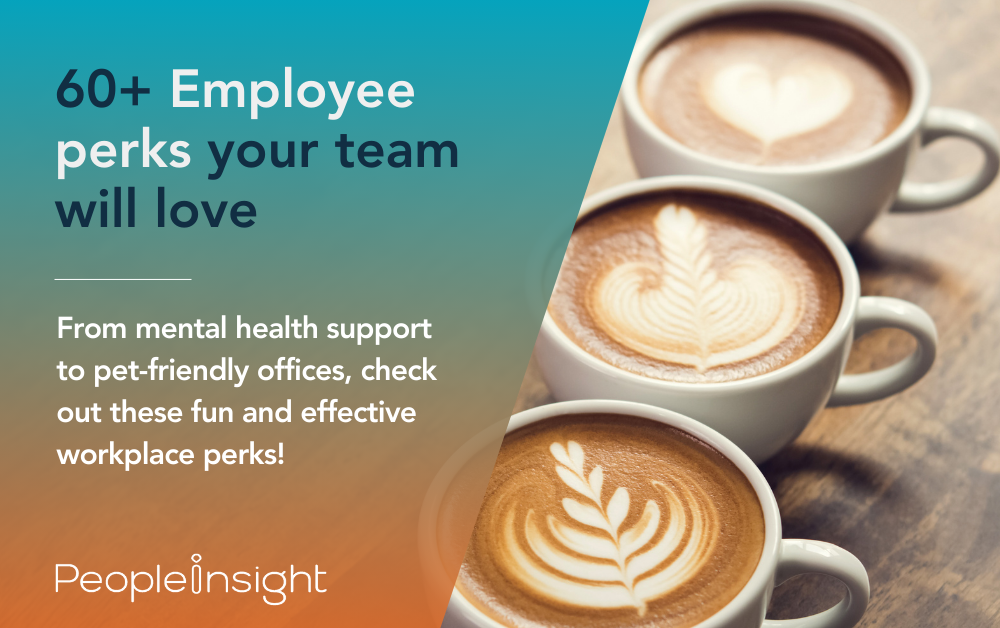
A quick insight: Employee perks are the additional benefits and experiences that enhance day-to-day work life and wellbeing. This post explores the types of perks people value most and highlights how thoughtful perks can support engagement, retention and a more positive workplace experience.
At a time when finding the right employee, and keeping them on board for the long haul, can feel like a challenge, employee perks are something you need to get right. It’s not a superficial thing, either — employee perks often go far beyond free coffee, sometimes providing employees with flexibility and freedoms that motivate and inspire them in meaningful ways. But let’s not underestimate the value of a free coffee — after all, it definitely puts a little pep in our step!
Below, we’ve compiled over 60 employee perks that your team will love, categorised to address various aspects of their professional and personal lives.
Related: What is an employee value proposition?
1. Private health insurance
Providing comprehensive health coverage ensures employees have access to necessary medical services without financial strain.
2. Mental health support
Offering free therapy sessions or counselling services can help employees manage stress and maintain mental wellbeing, ultimately helping to prevent burnout.
3. On-site fitness facilities
Access to a gym or fitness centre encourages regular exercise, promoting physical health.
4. Workplace yoga classes
Organising yoga sessions can enhance flexibility, reduce stress and improve concentration.
5. Health and wellness workshops
Hosting seminars on nutrition, stress management and healthy living educates employees on maintaining a balanced lifestyle — all the better to remain at peak performance!
6. Flu vaccinations
Providing annual flu shots can reduce illness-related absences while showing employees you care about their welfare.
7. Ergonomic assessments
Ensuring workstations are ergonomically designed can prevent musculoskeletal issues — remember, when discussing employee engagement, we need to consider the physical environment, too.
8. Subsidised fitness memberships
Offering discounts on gym memberships encourages employees to stay active.
9. Healthy office snacks
Providing nutritious snacks promotes healthy eating habits during work hours.
10. Mindfulness app subscriptions
Access to apps like Calm or Headspace supports mental health through guided meditations.
11. Flexible working hours
Allowing employees to adjust their schedules helps them manage personal commitments in a way that works for them.
12. Remote work options
Providing the choice to work from home offers convenience and can increase productivity — we all know that hybrid workers can add a lot of value, and entirely remote employees can be a massive asset to your organisation, without compromising on output.
13. Compressed workweeks
Allowing employees to work longer hours over fewer days grants them extended weekends — a lot of companies have seen some remarkable results following the introduction of four-day work weeks.
14. Additional annual leave
Offering extra time away from the office allows employees to recharge and spend time with loved ones.
15. Sabbatical programmes
Change might be as good as a rest, but sometimes we just need a rest. Or more specifically, a break. Allowing extended leave for personal development or travel can rejuvenate long-term employees.
16. Family leave policies
Providing generous maternity, paternity and adoption leave supports employees during significant life events.
17. Childcare support
Offering on-site childcare or subsidies eases the burden of finding reliable care — and it can be particularly helpful when it comes to helping new parents transition back to full-time hours.
18. Elder care assistance
Providing resources or support for employees caring for ageing parents demonstrates empathy, which employees certainly appreciate.
19. Pet-friendly offices
Allowing pets in the workplace can reduce stress and increase general levels of happiness — who wouldn’t be more happy with a Golden Retriever snoozing at their feet?
20. Summer hours
Implementing shorter workdays during the summer months gives employees more personal time to spend with their children or other loved ones.
21. Performance bonuses
Our 2025 cross-sector data shows us that only 51% of employees believe their rewards are linked to their performance or contribution. Clearly, this is something that needs addressing. Rewarding employees for exceptional work provides financial incentives and recognises their contributions.
22. Overtime pay
Compensating employees for extra hours worked acknowledges their dedication — but be careful about overworking employees. Employees need to take time away from the office, and rest should be encouraged.
23. Company-sponsored retirement plans
Offering pension schemes helps employees plan for their future financial security.
24. Salary sacrifice schemes
Allowing employees to exchange part of their salary for non-cash benefits can result in significant tax savings.
25. Employee discounts
Providing discounts on company products or services adds value to employment.
26. Season ticket loans
Offering interest-free loans for public transport passes makes commuting more affordable.
27. Cycle-to-work schemes
Encouraging cycling by providing tax incentives for purchasing bikes promotes health and reduces commuting costs.
28. Financial planning workshops
Educating employees on budgeting, investing, and saving empowers them to manage their finances effectively.
29. Tuition reimbursement
Covering the cost of further education supports career development and reduces financial strain.
30. Referral bonuses
Rewarding employees for referring successful hires incentivises them to tap into their networks.
31. Training programmes
Offering workshops and courses improves employees’ skills and knowledge — everyone’s a winner.
32. Mentorship schemes
Pairing employees with experienced mentors supports career growth and guidance.
33. Conference attendance
Sponsoring participation in industry conferences keeps employees informed about the latest trends.
34. Professional memberships
Paying for memberships in professional organisations provides networking opportunities.
35. Leadership development programmes
Preparing employees for leadership roles ensures a strong internal talent pipeline.
36. Cross-departmental projects
Encouraging collaboration across departments broadens employees’ skill sets. It can also improve communication between departments, which is an ongoing struggle for most businesses. As of 2025, only 54% of employees believe that communication is good between different teams.
37. Language classes
Offering language courses enhances communication skills and cultural awareness. It might also be helpful for the business when expanding into new markets.
38. Certification reimbursement
Covering the cost of professional certifications validates employees’ expertise.
39. Lunch and learn sessions
Hosting informal learning sessions during lunch breaks promotes continuous education.
40. Access to online learning platforms
Providing subscriptions to platforms like LinkedIn Learning facilitates self-paced development.
41. Free lunches
Providing meals builds team bonding and saves employees time and money.
43. Team-building activities
Organising outings and events strengthens relationships and collaboration.
44. Recognition programmes
Acknowledging employees’ achievements boosts morale and motivation.
45. Casual dress code
Relaxing dress requirements creates a more comfortable and inclusive workplace, while sparing employee money, as they don’t have to shell out more cash on a formal wardrobe!
46. Celebrating birthdays and work anniversaries
Acknowledging milestones makes employees feel valued and appreciated.
47. Office social events
Regular get-togethers help employees connect outside of work and build strong relationships.
48. Volunteer days
Giving employees paid time off to support charitable causes builds a sense of purpose.
49. Recognition awards
Offering monthly or quarterly awards for achievements boosts motivation and engagement.
50. Surprise treats and gifts
Small gestures, such as sending gift cards or arranging surprise breakfasts, show appreciation.
51. Personalised perks
Allowing employees to choose a perk that suits their lifestyle, such as a book subscription or hobby-related allowance, makes benefits more meaningful.
52. On-site or subsidised parking
Making commuting easier reduces daily stress for employees who drive to work.
53. Free or subsidised public transport passes
Helping with travel expenses makes commuting more affordable.
54. On-site laundry services
Allowing employees to drop off laundry at work saves time during busy weeks.
55. Office concierge services
Offering help with tasks like dry cleaning, car servicing, or errand-running adds convenience.
56. Technology allowances
Providing a budget for high-quality headphones, keyboards, or ergonomic chairs improves comfort and efficiency.
57. Daily free coffee and tea
A stocked office kitchen helps keep energy levels up.
58. Office breakfast or snack bar
Providing fruit, cereals, and healthy snacks keeps employees fuelled throughout the day.
59. Meal delivery subsidies
Offering a discount on food delivery services makes lunch breaks easier.
60. Happy hour or Friday drinks
Hosting a casual end-of-week social event helps employees unwind.
61. Catered lunch days
Bringing in catered meals fosters social interaction and removes the stress of meal prep.
Giving employees opportunities to give back fosters a sense of purpose and shared values.
62. Matching charitable donations
Matching employees’ donations to charities encourages giving and social impact.
63. Paid volunteering time
Allowing employees to spend work hours volunteering supports causes they care about.
64. Sustainability initiatives
Providing reusable office supplies, composting options, or cycle-to-work schemes supports eco-conscious employees.
65. Diversity and inclusion initiatives
Hosting workshops and networking events promotes a more inclusive culture.
Employee perks are not just about attracting talent — they play a huge role in creating a positive, productive work environment. Offering meaningful benefits shows employees they are valued, which increases loyalty and engagement. When perks align with employees’ needs, they contribute to wellbeing, work-life balance and financial security.
However, the most effective perks are those that reflect what employees actually want. Without regular feedback, organisations risk investing in benefits that go unused or unnoticed. Employee surveys provide valuable insights into which perks make the most impact and where improvements can be made.
At People Insight, we help organisations listen to their employees through tailored employee surveys. Understanding what truly matters to your workforce allows you to introduce perks that make a real difference. Get in touch today to learn how employee surveys can help you build a more engaged and motivated workplace.

